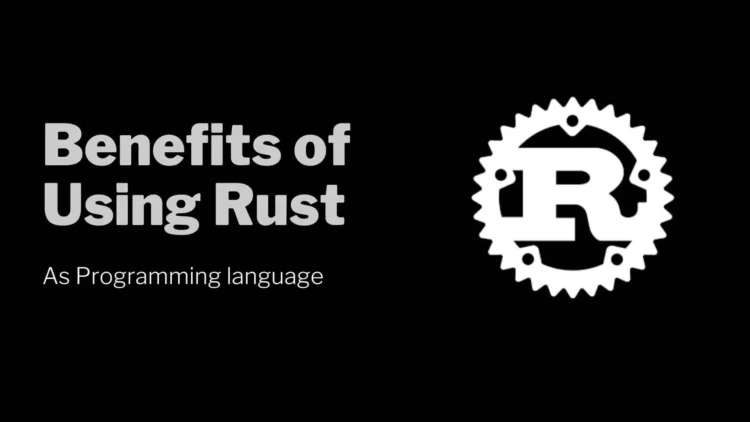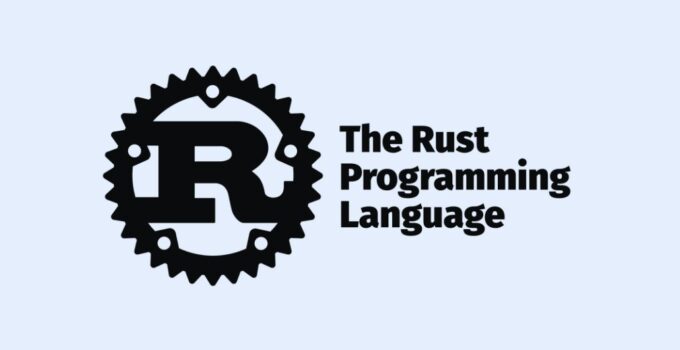In the ever-evolving realm of software development, the Rust language stands out as a beacon of innovation and efficiency. Born out of a desire to address some of the most pressing challenges developers face, it is not just another programming language; it’s a testament to what modern development should look like.
At its core, Rust is a systems programming language, but what sets it apart is its primary focus on memory safety without compromising performance. For developers and Rust development companies (like Evrone), this means the freedom to write fast, efficient code without the constant worry of memory-related bugs. The advantages of this language go beyond this, offering a rich set of library support, robust tooling, and a feature-packed ecosystem that’s geared towards creating both system-level and web applications.
The surge in Rust language popularity can be attributed to its unique approach to development. By prioritizing safety, it provides developers with a platform that reduces the time spent debugging and increases the time spent innovating. The language’s intuitive syntax and structure make it accessible to both newcomers and veterans in the coding world.
In essence, it is more than just a language; it’s a movement towards smarter, safer, and more efficient software development. As we delve deeper into this article, we’ll explore the myriad reasons behind the meteoric rise of Rust and how it’s changing the landscape of programming.
Rust Programming Language Popularity

Source: thenewstack.io
It’s no hyperbole to state that the Rust language has taken the developer community by storm. Its rapid ascent in the programming world isn’t a mere coincidence but a result of its compelling features and the tangible benefits it offers to projects and applications.
A significant testament to Rust language popularity is its consistent ranking in the Stack Overflow Developer Survey. For several consecutive years, it has been voted as the “Most Loved” programming language, a title reflecting the enthusiasm and satisfaction of its user base. This accolade is more than just a badge of honor; it’s indicative of a vibrant community that finds value in the language’s capabilities.
Its usage isn’t confined to a specific niche. Organizations, from small startups to tech giants like Microsoft and Google, have incorporated Rust into their development stack. For instance, Mozilla, the organization behind the popular Firefox web browser, utilized it for critical components of their software to enhance performance and security. Similarly, companies on the web and system development sectors have leaned on Rust for its concurrent processing capabilities, finding it especially useful for building high-performance web servers and operating systems.
The purpose behind its widespread adoption? Rust provides an optimal balance between speed, safety, and concurrency, making it a prime choice for developers aiming to write robust and efficient code. Whether it’s for building intricate web applications, system tools, or even game engines, it has proven time and time again that it’s up to the challenge.
Rust Language Advantages

Source: coresumo.com
When it comes to the competitive realm of programming languages, Rust carves out a distinguished position, thanks to an array of advantages that cater to developers’ real-world needs. Let’s delve into some of the key benefits that have contributed to the robust Rust language popularity.
- Memory safety with speed. Its unique ownership system ensures memory safety without the need for a garbage collector. This means that developers can achieve the performance close to languages like C and C++ but without many of the associated risks.
- Concurrency mastered. Writing concurrent code can often lead to complex bugs and system vulnerabilities. Rust’s language design inherently manages these issues, making it easier for developers to write safe, concurrent programs.
- Rich ecosystem. It offers a growing collection of libraries and tools that aid in accelerating project development. The package manager, Cargo, simplifies the process of building and sharing packages, enhancing developer productivity.
- Cross-platform development. Rust supports a wide array of platforms, making it ideal for everything from web applications to embedded systems.
- Immutable by default. It encourages immutable code, which leads to fewer bugs and more predictable software outcomes.
- Vibrant community and resources. Rust’s community is not only passionate but also highly collaborative. With an ever-growing repository of online resources, tutorials, and forums, developers find it easy to onboard and resolve challenges.
- Low overhead. Rust applications are known for their lean nature, reducing runtime overhead and resulting in efficient software builds.
- Robust error handling. Its compiler, known for its helpful error messages, ensures developers spend less time debugging and more time refining their code.
The advantages of the Rust language are manifold, making it a compelling choice for projects ranging from web development to system programming. Its emphasis on safety, without compromising on performance, truly sets it apart in the vast sea of programming languages.
Conclusion

Source: preettheman.medium.com
As we’ve journeyed through the intricacies and strengths of Rust, it’s evident that its rise in the programming world is not fleeting but foundational. The Rust language, with its amalgamation of memory safety, performance efficiency, and a community-driven approach, paints a picture of the future of software development—one that is both secure and innovative. Read our guide and learn what to consider when choosing reliable software development partners.
The essence of Rust language popularity isn’t just confined to its technical prowess but also the tangible real-world benefits it brings to projects. Developers are no longer forced to choose between performance and safety; with Rust, they are entwined seamlessly. From startups charting out new territories in tech to industry giants reshaping the digital landscape, Rust finds its place, affirming its versatility and promise.
As with any technology, the true measure of its impact is not just in its features but its application. The diverse projects and applications harnessing Rust’s advantages are a testament to its potential and the solutions it offers to longstanding programming challenges.
In the ever-evolving tech panorama, Rust stands as a beacon of what’s possible when a language is built with both the developer and the end-user in mind. For those on the cusp of choosing a language for their next big venture, Rust offers a path paved with innovation, safety, and community spirit.





